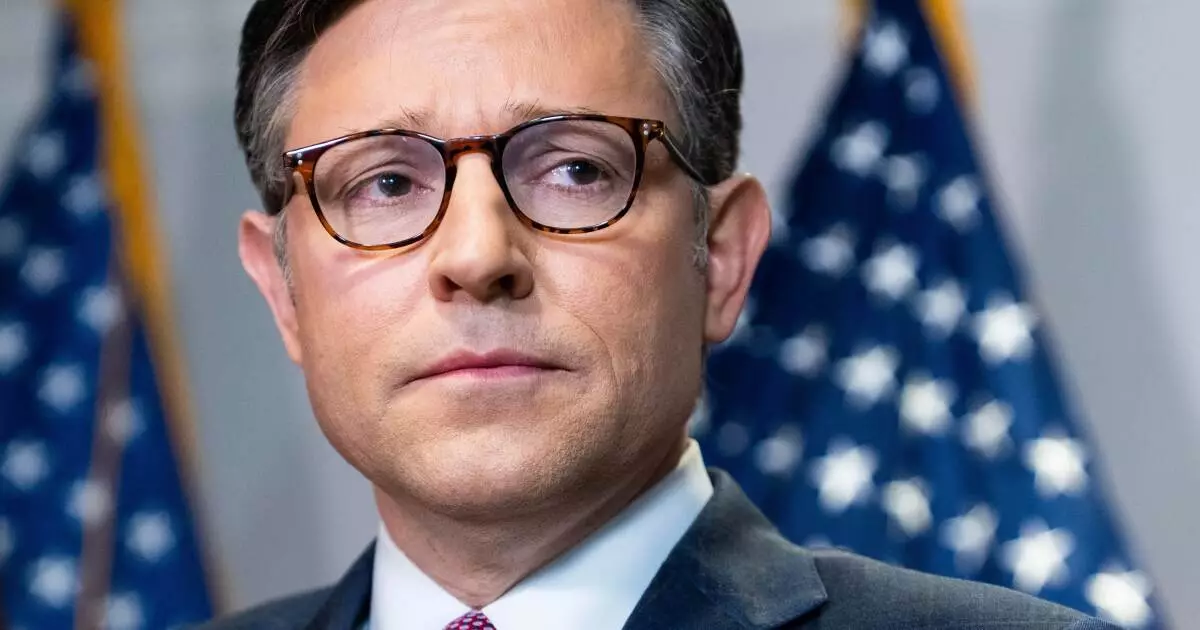As the September 30 deadline looms, House Republicans find themselves entangled in a complex dispute over legislation that not only affects government operations but also intertwines with voting regulations. The potential for a government shutdown brings a heightened sense of urgency amid clashes over the so-called “Safeguard American Voter Eligibility Act,” a bill purportedly designed to fortify voting security by implementing additional barriers against non-U.S. citizens casting ballots in presidential elections.
House Speaker Mike Johnson (R-La.) has taken on a prominent role in advocating for the passage of the Voting Eligibility Act, portraying it as an essential measure for restoring integrity in the electoral process. He asserted that this vote could stand as one of the most consequential in the career of the chamber’s members, emphasizing a sense of crisis around the necessity of addressing the issue now. However, the party’s internal discord complicates this narrative, as various factions, notably those aligned with defense interests, express skepticism over prioritizing voting legislation over military funding needs.
This internal party division culminated in a decision to withdraw the bill from the legislative calendar just hours before the scheduled vote, showcasing a reluctance among some Republicans to alienate crucial supporters who prioritize defense spending. This development not only illustrates the fractures within the party but also raises questions about the broader implications of linking funding measures to legislative agendas that may not enjoy unanimous support.
The stakes extend well beyond the walls of Congress. A partial or total government shutdown could dramatically impact state and local governments, many of which rely on federal funding to cover a significant portion of their budgets. Local authorities, as expressed by Nicole Weissman from the National Association of Counties, depend on a steady flow of intergovernmental revenues to meet their obligations. The unpredictability that comes with a government shutdown introduces a risky dynamic to their financial planning, affecting essential services and operations.
Irma Esparza Diggs from the National League of Cities further elaborates on this concern by noting that many federal grants operate on a reimbursement model. Local governments typically incur costs upfront for projects and subsequently seek reimbursement from federal agencies. A disruption to this process, particularly during a shutdown, may leave municipalities in precariously long financial limbo, as they would be forced to delay projects or find alternative funding sources until the federal government resumes its operations.
Strategizing for Future Fiscal Responsibility
The proposed $1.6 trillion spending plan seeks to extend current funding levels for six months, a strategic maneuver to provide leeway while awaiting potential shifts in the political landscape following the upcoming elections. Notably, former President Donald Trump has voiced his support for the continuing resolution, further complicating the dynamics at play given the ex-president’s influence within the party.
As the appropriations process takes shape leading into the new fiscal year, the potential for emergencies and side deals can sway priorities and alter funding allocations significantly. A history of tumultuous appropriations debates, such as those that unseated former Speaker Kevin McCarthy, reinforces the chaotic nature of the congressional budget process and the often unpredictable consequences that can arise from it.
Legislators and local officials alike increasingly recognize the need to stabilize the fiscal calendar to avoid the brinkmanship that hinders effective governance. The convoluted journey from presidential budget proposals, which are submitted well in advance, to finalized appropriations represents a critical timeline that, if adhered to, can yield more predictable funding outcomes leading into each fiscal year.
The Need for Bipartisanship
In light of the current impasse, there is an urgent need for bipartisanship to navigate not only the complexities of government funding but also the essential issue of secure and fair voting practices. As localities grapple with the potential fallout from a failed budgetary process, the reliance on Washington’s decision-making becomes more evident. Across the aisle, compromises need to be forged to ensure that both defense and local governmental needs are met, without politicizing essential services upon which millions depend.
The interplay between government funding and voting legislation reveals a broader narrative of division within the Republican Party and the vital importance of coherent collaboration in addressing the needs of constituents. Clarity and predictability are essential for governance, and a measured approach to both fiscal and voting matters will be critical in fostering stability in the face of uncertainty.

